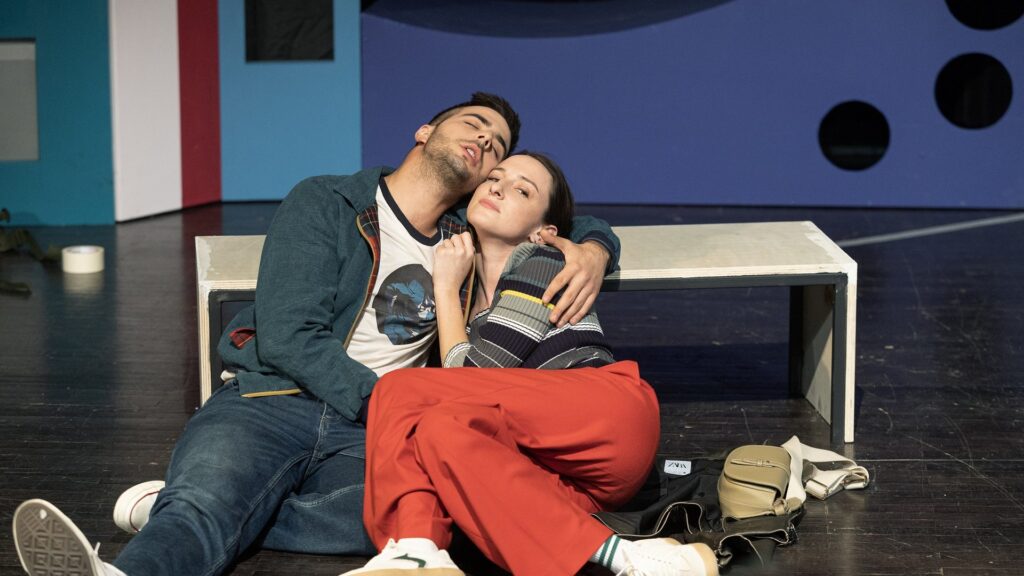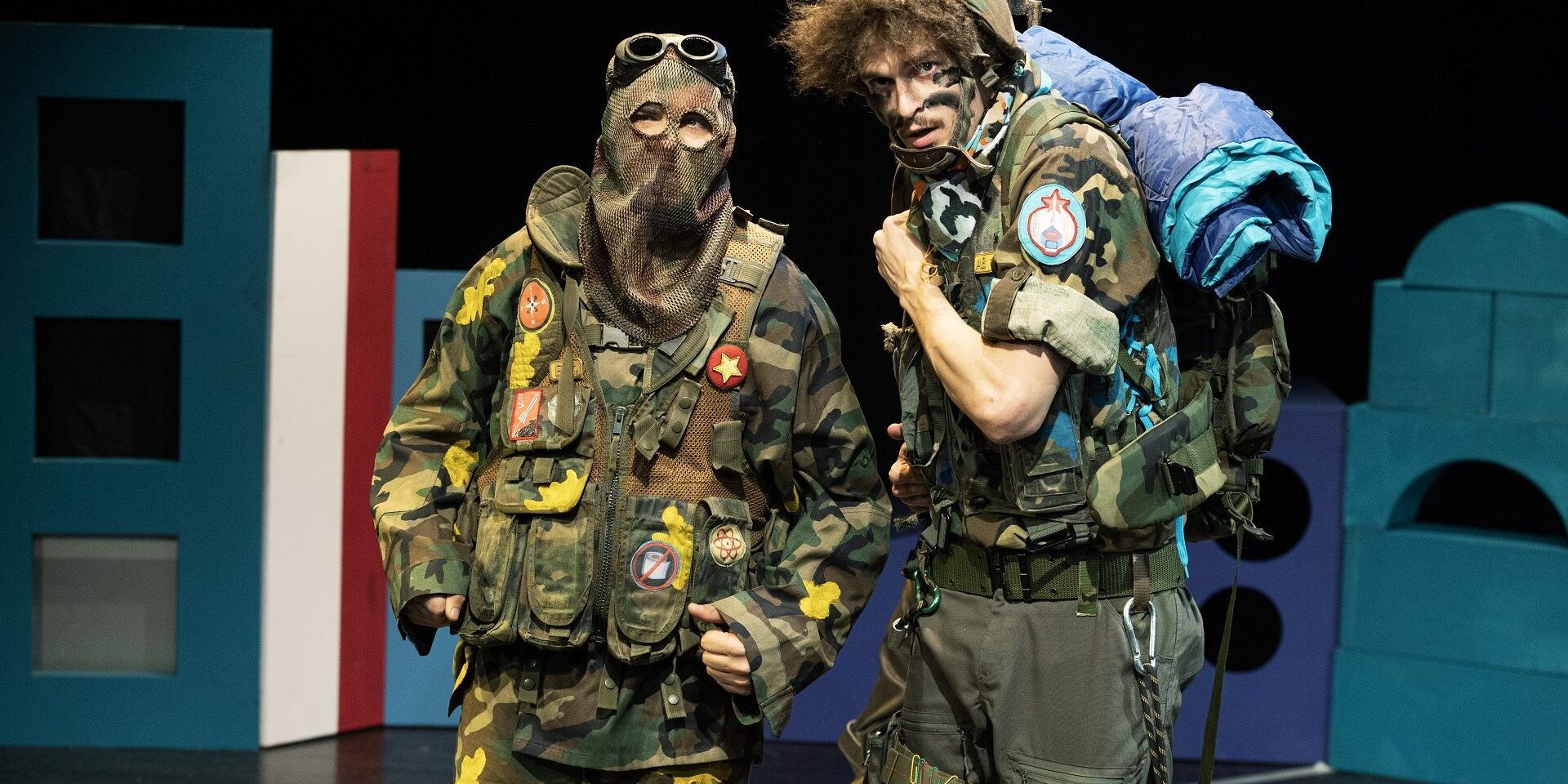Yugoslav Drama Theatre, Belgrade, premiere 25th November 2023
If the ducks know what‘s good for them, they will stay on their side of the lake.
Kieran Lynn‘s 2012 play An Incident at the Border has been described as “half way between Ionesco and Kafka“. It follows the story of two young lovers, Arthur (Dragan Petrović) and Olivia (Mina Obradović), and a border guard (Vukašin Jovanović) placing a duct tape border in between them, because their country has been divided. Everybody is aware of the fact that the border is merely duct tape, the countries are nameless, the border guard‘s boss has no idea who is above him and why there is a need for the border at all. Trying to find the way to reunite, Arthur and Olivia start to question their love, while the border guard questions his own motives in life. The play has a highly promising and deeply relevant concept, resonant not just because of the history of the Balkan states but the present wars in Ukraine and Gaza as well. Unfortunately, Lynn‘s play does not develop this concept further and certianly doesn‘t reach the mastery of Ionesco or Kafka.
The Studio of the Yugoslav Drama Theatre is a perfect space for more intimate performances like this. Young director Stefan Gajić, in his first production for YDT, keeps the performance universal in language (translated by Vesna Radovanović). The use of smartphones in the beginning is the only clear sign that we are watching a play set in modern times. However, radio broadcasting is present through the performance as well, which is more suggestive of the 20th century. The choice of wardrobe (costumes by Biljana Grgur), such as sneakers, flannels, jeans and the recognisable military print uniform, could be interpreted both as deriving from the 20th and 21st century. As a result while the story could be set today, there is a strong feeling of the past present in the air.
The story takes place on the children‘s playground (set design by Marta Dogan). When faced with a difficult decision, the characters play on the swing or slide, a witty representation of their incapability of dealing with serious issues.
But, although the story serves as a potent metaphor, the dramaturgy isn‘t strong enough to support this idea, therefore leaving many empty spaces around the three characters, their motives and emotional lives. The incapability of these people to walk across literal duct tape wasn‘t explored enough, which is a shame because it could have had a really strong punch.

Incident at the Border. Photo: Nebojsa Babic
Other than the fact that Arthur wants to be a duck and the border guard likes tigers, we know little about these characters and therefore struggle to relate to them or grasp their feeling towards each other. Arthur and Olivia constantly slide between liking and despising each other, which might be a simple mirror of their own feelings, however in the end it still remains ambiguous. It is hinted that the border guard is developing feelings for Olivia, but the scale of those affections is uncertain as well. A song called Odlazim (I‘m leaving), resembling a Yugoslavian pop songs, plays in the beginning and the end of the performance, setting a nostalgic tone but also serving as a minor contextual link to Serbian history (the music is composed by Ana Krstajić). More additions like this would have helped to deepen the story and solidify the point of view.
The dark humour of the absurdity at large didn‘t always land, but there were a few comedic jackpots. My personal favourite was the scene with the border guard endlessly naming everybody above his boss, and finally, in a true satirical manner, revealing that nobody actually knows who is in command. That scene was funny by itself, but Jovanović’s passionate delivery added another layer and enhanced it.
The border guard‘s boss is called George, and Arthur‘s new boss is called Jeff. As a result, it feels like they don‘t really connect to the Serbian audience. The tragedy in the end could be sensed from the beginning, but the transition from putting on duct tape borders on the floor and swinging a taser to owning actual weaponry and being in the middle of a war wasn‘t the smoothest. These inconsistencies can perhaps be forgiven in a satire, because we know the world before us is out of place. For that reason, I didn‘t mind that Arthur and Olivia had cell phones but didn‘t use them to ask for help, and I didn‘t mind that the border guard was always unreasonably nice to the two trespassers.
Nearing the end the border gets ripped up, but Arthur and Olivia rush to fix it, blinded by their personal struggles. Soon after, the border guard builds a wall out of the children‘s playground, and passing the border really becomes impossible without an inevitable tragedy. These scenes were strong and Gajić painted a very clear picture in the end.
Overall, the creative team behind the performance have brought out as much as they could from what is quite a basic text, in order to paint the omnipresent story of invisible borders between countries and people. However, the general, bittersweet feeling of senselessness and hopelessness didn’t quite translate and I was left longing for more.
Credits:
Author: Kieran Lynn//Director: Stefan Gajić//Costumes: Biljana Grgur//Set: Marta Dogan
For tickets and more information, visit: jdp.rs
Ana Ogrizović is a Dramaturgy graduate from Serbia, recognised by multiple poetry, prose and playwriting competitions. She is currently pursing a Masters degree and editing her first poetry book.








